Editorships
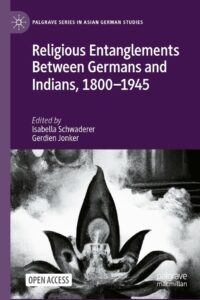
Religious Entanglements Between Germans and Indians, 1800–1945
Isabella Schwaderer und Gerdien Jonker (2023)
Religion as a form of cultural expression constitutes a critical element in the relationship between Germany and India. The discovery of Indian traditions in Germany and re-interpretations of those traditions in India fueled not only new theological and philosophical explorations, but also extensive innovations in the fields of music, dance, bodily experience, and political intervention. Seeking to uncover the enfolding of colonial thought structures through presentations of the Self, while placing them in the context of global colonial value chains that connected the peripheries with the centre, this interdisciplinary volume addresses India through the lens of an entangled relationship. Adopting the position that the acceleration of communication, technical development, and colonisation locally triggered re-interpretations of the religious sphere, This volume takes a look at the period from 1800 to the end of National Socialism, tracing the strands of an Indo-Germanic religion in the making as it goes along. A special emphasis is placed on the artistic expressions of religious experience including re-enactments of musical compositions and dance configurations, which were created to embody India in Germany.
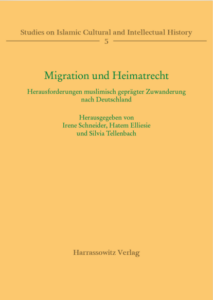
Migration und Heimatrecht. Herausforderungen muslimisch geprägter Zuwanderung nach Deutschland.
Irene Schneider, Hatem Elliesie und Silvia Tellenbach (2022)
Dieser Sammelband, hervorgegangen aus der Jahrestagung der Gesellschaft für Arabisches und Islamisches Recht 2019 an der Georg-August-Universität Göttingen, befasst sich mit Migration und Heimatrecht. Die Relevanz der Thematik ergibt sich aus der zahlenmäßig großen Zuwanderung Flüchtender aus den Kriegs- und Bürgerkriegsgebieten des Nahen Ostens, vor allem Iraks und Syriens, die vorwiegend in den Jahren 2014 und 2015 nach Deutschland kamen. Thematisiert werden zum einen der Umgang des deutschen Rechtssystems mit konkreten Rechtsfragen und typischen Problemstellungen, die sich aus der Situation der Migration ergeben. Aber auch die Heimat- bzw. Ausgangsrechte sowie die gesellschaftliche Situation der Migrant*innen in ihren Heimatländern, die für diese Menschen bis zum unfreiwilligen Verlassen ihrer Länder ihre selbstverständliche rechtliche Lebensgrundlage bildeten, werden angesprochen. Die Autor*innen dieser Beiträge sind Jurist*innen und Islamwissenschaftler*innen, aber auch Praktiker*innen, die Einblicke in praktische Aspekte des Familienrechts und hier vor allem des Kindeswohls in Deutschland geben. Der Band lotet aus, wie und in welchen Formen gesellschaftliche und familiäre Einbettungen von Migrant*innen im Rahmen der bundesdeutschen Ordnung funktionieren.
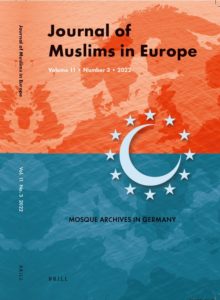
Mosque Archives in Germany
Gerdien Jonker und Stephanie Müssig (2022)
With this Special Issue, the authors want to draw attention to the position of mosque archives in Europe, starting with a study of mosque archives in Germany. The primary aim of the issue is to raise awareness among scholars of mosque archives as a resource for research on Muslim life and Islam. Our second aim is to offer an overview of different kinds of mosque archives in relation to their historical period(s). Our third aim has been to open a window onto the administrators of mosque archives and their approaches to collecting relics of the past.
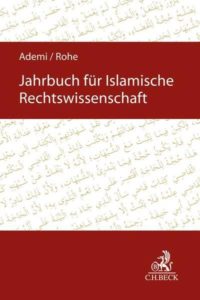
Jahrbuch für Islamische Rechtswissenschaft
Ҫefli Ademi und Mathias Rohe (2021)
Das Werk soll nationalen und internationalen Rechts- und Islamwissenschaftlern die Möglichkeit einräumen, sich fachlich mit der islamischen Rechtswissenschaft und die damit verbundenen Fragen konzentriert auseinanderzusetzen. Über die wissenschaftliche Ausarbeitung hinaus erstreckt sich die Themenrelevanz aber auch auf gesellschaftliche Diskurse, die dazu beitragen können, das stark emotionsgeladene Diskussionsklima, etwa über die Scharia, zu versachlichen. In dem Jahrbuch werden vor allem die klassischen islamjuristischen Disziplinen (ulum alscharia) vor dem Hintergrund gegenwärtiger Rechtskontexte beleuchtet und vermittelt.
Im ersten Band werden zunächst die grundlegenden Begrifflichkeiten aus der Islamischen Rechtswissenschaft besprochen, damit von vornherein ein zuverlässiger Einstieg in die islamjuristische Disziplin vor dem Hintergrund europäischer Rechtskulturen gewährleistet und weitverbreitete begriffliche und strukturelle Missverständnisse ausgeräumt werden.
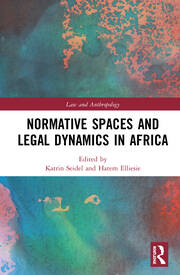
Normative Spaces and Legal Dynamics in Africa
Hatem Elliesie und Katrin Seidel (2020)
African legal realities reflect an intertwining of transnational, regional, and local normative frameworks, institutions, and practices that challenge the idea of the sovereign territorial state. This book analyses the novel constellations of governance actors and conditions under which they interact and compete. The work follows a spatial approach as the emphasis on normative spaces opens avenues to better understand power relations, processes of institutionalization, and the production of legitimacy and normativities themselves.
Selected case studies from thirteen African countries deliver new empirical data and grounded insights from, and into, particular normative spaces. The individual chapters explore the interrelationships between various normative orders, diverse actors, and their influences. The encounters between different normative understandings and actors open up space and multiple forums for negotiating values. The authors analyse how different doctrines, institutions, and practices are constructed, contested, negotiated, and adapted in translation processes and thereby continuously reshape Africa’s multidimensional normative spaces.
The volume delivers nuanced views of jurisprudence in Africa and presents an excellent resource for scholars and students of anthropology, legal geography, legal studies, sociology, political sciences, international relations, African studies, and anyone wishing to gain a better understanding of how legal constellations are shaped by unreflected assumptions about the state and the rule of law.
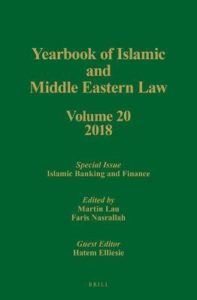
Islamic Finance and Banking
Katrin Seidel und Hatem Elliesie (2018)
Practitioners and academics dealing with the Middle East can turn to the Yearbook of Islamic and Middle Eastern Law for an instant source of information on the developments over an entire year in the region. The Yearbook covers Islamic and non-Islamic legal subjects, including the laws themselves, of some twenty Arab and other Islamic countries as well as international legal developments in the region.
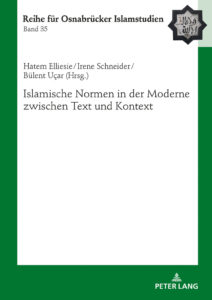
Islamische Normen in der Moderne zwischen Text und Kontext
Hatem Elliesie, Irene Schneider und Bülent Uçar (2019)
Islamische Normen in der Moderne zwischen Text und Kontext erschien zum 20-jährigen Jubiläum der Gesellschaft für Arabisches und Islamisches Recht und zum 5-jährigen Jubiläum des Instituts für Islamische Theologie an der Universität Osnabrück. Ein Teil der Beiträge basiert auf Vorträgen einer gemeinsamen Tagung zum Thema Religiöse Normen in der Moderne zwischen Text und Kontext, die im Oktober 2017 an der Universität Osnabrück stattfand. Weitere Abhandlungen ausgewählter Fachvertreter wurden eingebunden. Ziel dieser Publikation ist es, die deutschsprachige Forschung zur islamischen Normativität multidisziplinär aufzufächern und insbesondere zwischen den Fachdisziplinen der islamischen Theologie, Islam- sowie Rechtswissenschaft stärker zu vernetzen
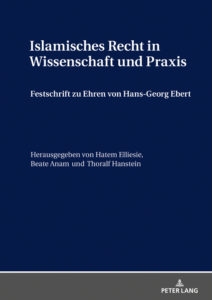
Islamisches Recht in Wissenschaft und Praxis: Festschrift zu Ehren von Hans-Georg Ebert
Hatem Elliesie, Beate Anam und Thoralf Hanstein (2018)
Islamisches Recht in Wissenschaft und Praxis: Festschrift zu Ehren von Hans-Georg Ebert erschien zum 65. Geburtstag von Hans-Georg Ebert, der seit 1998 Professor für Islamisches Recht an der Universität Leipzig war. In dem Band haben sich nationale und internationale Fachkolleg*innen und Schüler*innen zum Anlass genommen, um in ihren Beiträgen Themen aufzugreifen, die auch der Jubilar in seinem bisherigen Berufsleben auf dem weiten Feld der Forschung zum Islamischen Recht und Recht der arabischen Länder bearbeitet hat. Der Kontext dieses Bandes erstreckt sich somit über das klassische sowie auch das modern geprägte islamische Recht, die islamische Normativität, das islamische Finanzwesen und den Komplex Recht und Sprache. An der Festschrift haben sich seitens des EZIRE Mathias Rohe und Hatem Elliesie mit Beiträgen beteiligt.
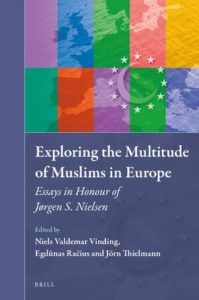
Exploring the Multitude of Muslims in Europe
Jörn Thielmann, Niels Valdemar Vinding und Egdūnas Račius (2018)
In Exploring the Multitude of Muslims in Europe a number of friends and colleagues of Jørgen S. Nielsen have joined together to celebrate his life and work by reflecting his more than forty years of scholarly contributions to the study of Islam and Muslims in Europe. The fourteen articles move through conceptualisations, productions and explorations of the multitudes of Muslims in Europe, and the authors draw on Jørgen S. Nielsen’s own work on the history and challenges of the Muslim community in Europe, critical thinking, ethnicities and theologies of Muslims in Europe, Muslim minorities, Muslim-Christian relations, and on Islamic legal challenges in Europe.
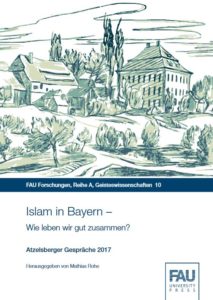
Islam in Bayern – Wie leben wir gut zusammen?
Mathias Rohe (2017)
„Nachdem es sich die Dr. Alfred-Vinzl-Stiftung an der Friedrich-Alexander-Universität Erlangen-Nürnberg (FAU) seit vielen Jahren zur Aufgabe gemacht hat, bei ihren jährlich stattfindenden „Atzelsberger Gesprächen“ Politik und Gesellschaft bewegende aktuelle Probleme zu thematisieren und in wissenschaftlichen Vorträgen zu behandeln, lag es nahe, sich auch dem Verhältnis von Islam und Deutschland zuzuwenden, eingegrenzter: „Islam in Bayern“, und die Frage zu stellen: „Wie leben wir gut zusammen?“ Diese Frage prägte die 36. Atzelsberger Gespräche im Juli 2016 und wurde in den Vorträgen thematisiert, die in diesem Band abgebildet werden.
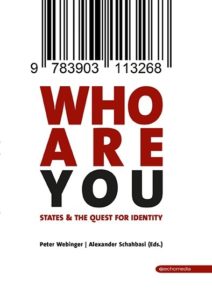
WHO ARE YOU – States & the Quest for Identity
Peter Webinger und Alexander Schahbasi (2017)
Globalization and migration are impacting nation-states at an unprecedented scale. While states have to manage ever-increasing mobility and diversity, people struggle to find their identity in this new world. Policy-makers are facing the challenge of addressing those areas where individual identity and governance interfere. To provide stability governments need to develop policies reflecting individual as well as national aspirations for identity, so both – man and state – have an unambiguous response to the question: WHO ARE YOU?
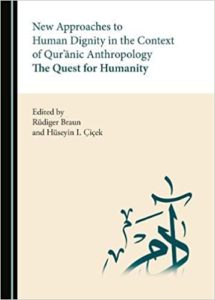
New Approaches to Human Dignity in the Context of Qur’anic Anthropology
Rüdiger Braun und Hüseyin Çiçek (2017)
Der neue Sammelband von Rüdiger Braun und Dr. Hüseyin Çiçek, wissenschaftlicher Mitarbeiter am EZIRE, präsentiert Ansätze zur islamischen theologischen Anthropologie. Im Fokus steht insbesondere das Narrativ von Adam und Iblis, welches seinen Weg in alle monotheistischen Traditionen gefunden hat.
Der Schwerpunkt liegt auf der speziellen „Grammatik“ anthropologischer Narrative, einmal im Koran selbst, aber auch in seinen Auslegungen. Die normativen Implikationen des Menschenbildes, welches dem Koran und den interpretativen Schriften entnommen wird, werden außerdem im Buch diskutiert. Das Werk zeigt die dynamischen Wechselbeziehungen zwischen Koranhermeneutik, theologischer Anthropologie und Rechtsphilosophie im europäischen Kontext auf und verhilft zu einem tieferen Einblick in die Multiperspektivität und Indexikalität der theologischen Anthropologie.
Auch ein Beitrag von Hüseyin Çiçek selbst ist vertreten: In „The Transformation of Mythical, Biblical and Apocryphal Narrations in the Quran: A Mimetic Approach“ beleuchtet der Religionspolitologe exemplarisch die mimetische Koranexegese.
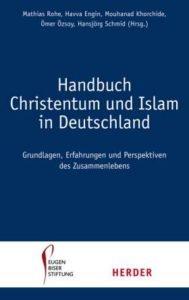
Handbuch Christentum und Islam in Deutschland
Mathias Rohe, Mouhanad Khorchide, Havva Engin u.a. (2014)
55 renommierte christliche und muslimische Autorinnen und Autoren – alle in Deutschland lebend – treten im „Handbuch Christentum und Islam in Deutschland” in den Dialog, fragen, welche Herausforderungen anstehen und diskutieren, wie man ihnen begegnen könnte. Das zweibändige Werk liefert so einen wegweisenden und praxisnahen Zwischenbericht zur Integrationsdebatte, öffnet die Wahrnehmung für die jeweils andere Sicht der Dinge und gibt so als Arbeitsbuch konkret Hilfestellung in religiösen, politischen und gesellschaftlichen Fragen des Zusammenlebens. Das Basiswerk erscheint im Verlag Herder, Herausgeber ist die Eugen-Biser-Stiftung, das Geleitwort kommt von Bundespräsident a. D. Christian Wulff.
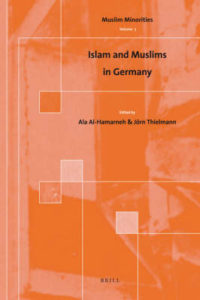
Islam and Muslims in Germany
Ala Al-Hamarneh und Jörn Thielmann (2014)
In the European discourse of post-9/11 reality, concepts such as “Multiculturalism”, “Integration” and “European Islam” are becoming more and more topical. The empirically-based contributions in this volume aim to reflect the variety of current Muslim social practices and life-worlds in Germany. The volume goes beyond the fragmented methods of minority case studies and the monolithic view of Muslims as portrayed by mass media to present fresh theoretical approaches and in-depth analyses of a rich mosaic of communities, cultures and social practices. Issues of politics, religion, society, economics, media, art, literature, law and gender are addressed. The result is a vibrant state-of-the-art publication of studies of real-life communities and individuals.
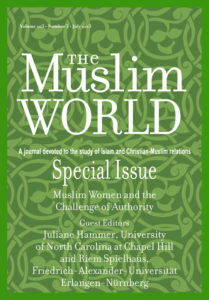
Special Issue of The Muslim World: Muslim Women and the Challenge of Authority
Riem Spielhaus und Juliane Hammer (2013)